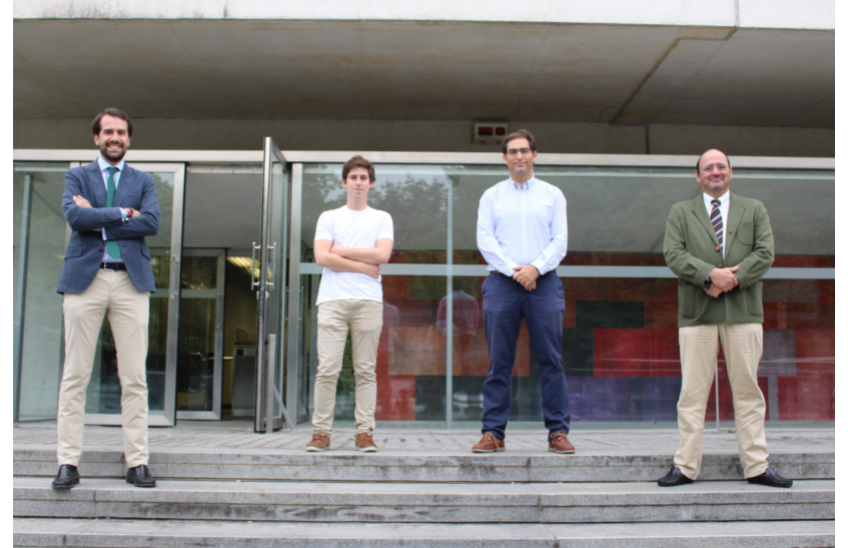News
LATEST NEWS AND EVENTS FROM THE SCHOOL OF ENGINEERING
University engineers develop a bioinformatics tool that advances personalized nutrition
The study, published in Nature Communications, could help optimise personalised diets by modulating the gut microbiota.

FotoCedida/IñigoApaolaza, Telmo Blasco, Franscisco Planes and Ángel Rubio, researchers of the department de Ingeniería Biomédica of Tecnun, School of Engineering of the University of Navarra.
06 | 08 | 2021
More than one hundred trillion microorganisms live in the intestine and make up the intestinal microbiota. The microbiota acts as a barrier that protects the body from disease-causing bacteria, keeps the immune system in good working order or financial aid to digest food components that the body could not digest on its own.
Researchers from Tecnunthe School of Engineering of the University of Navarra, have published a article in 'Nature Communications' that would allow the development of personalized nutrition programs taking into account the composition of the microbiota of each individual. It should be noted that the published work is part of the European project Stance4Health, whose goal is to integrate the intestinal microbiota in nutrition tools and personalize the development of diets in different pathologies such as obesity, celiac disease and different types of allergies. The study has counted with the participation of the University of Granada and the FISABIO Foundation of Valencia.
"Current personalized nutrition tools primarily use genetic data from the patient. This approach is incomplete and poorly optimized because they do not take into account the metabolic contribution of the intestinal microbiota," says Francisco J. Planes, researcher of department Biomedical Engineering who led the study at Tecnun. "The tool we have developed allows us to predict how the microbiota of each individual breaks down food in the intestine and, therefore, to anticipate in order to decide which foods are most recommendable for each person, taking into account their metabolic contribution and the clinical condition of each person," says Planes, who is Deputy Director of Research at Tecnun.
Likewise, José Ángel Rufián, researcher principal of department of Nutrition at the University of Granada and coordinator of project Stance4Health, points out that "taking into account the intestinal microbiota in personalized nutrition programs has enormous potential because the compounds produced by a well-balanced microbiota can protect us from development of chronic diseases".
In this study, whose lead author is Telmo Blasco, a PhD student at Tecnun, the researchers have significantly expanded the instructions data and computational models, since, as Blasco points out, "today there is a diversity of food groups and nutrients for which information is very scarce".
Using various bioinformatics techniques, they have completed the metabolism of 250 nutrients, such as phenolic compounds, which are present in plant foods such as fruits, vegetables, legumes and beverages such as tea and coffee.
"It is important to understand that the microbiota functions as a large biochemical reactor composed of thousands of bacteria whose metabolic capabilities exceed those of human cells," says Maria Pilar Francino, the researcher who led the study at FISABIO. And she concludes: "Through a complex series of processes, the bacteria housed in our intestine influence how our body processes food. In turn, these foods can alter the microbial community inside us and this interaction per diem expenses-microorganisms can drastically modify health".
